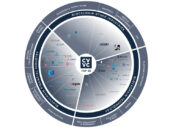Blockchain has the potential to transform the asset management industry by allowing new products to be developed, improve efficiency and cost-savings, and enhance data quality, according to a new report by blockchain software company ConsenSys.
In its first report part of a series titled An Executive’s Guide to the Future of Asset Management, ConsenSys delves into the key role blockchain is set to play in the future of asset management, examining a variety of use cases demonstrating the technology’s transformative potential.
Tokenization
One major innovation that blockchain allows for is tokenization, a process in which tokens are created on the blockchain as a digital representation of a unit of value.
Different types of tokens exist such as the security tokens, which are backed by tradable assets such as precious metals or real estate, the equity tokens, a subcategory of security tokens that represent ownership of an asset such as debt or company stock, and the utility tokens, which provide users with access to a product or service.
Through the tokenization of assets, blockchain enhances the liquidity of unlisted assets and traditionally illiquid assets such as real estate, allows for increased transaction transparency, reduces the risk of fraud, and significantly reduces liability management costs for issuers since token transfers can be automatically filled and executed via smart contracts.
One company that is tapping into this opportunity is Mata Capital, an independent investment company specialized in structuring and managing real estate investment funds on behalf of institutional and high net worth individuals.
Mata Capital deployed in July a blockchain platform aimed at optimizing the processing of securities registers for its real estate investment products.
Mata Capital registers financial assets – in this case, the shares of a capital company that owns real estate – and associated rights in the form of a “token” represented on the Ethereum blockchain.
Custody of digital assets
With the rise of tokenized assets and cryptocurrencies, custody solutions tailored for this emerging asset class are rapidly becoming a priority for custodian companies.
Custodians already play a key role for traditional securities and these companies have the potential to play “a pivotal role” in the custody of security tokens and other kinds of tokenized assets, the report says.
It cites the case of Trustology, a company that offers custody services for personal, business and institutional clients.
Last year, Trustology launched its TrustVault personal account product in the UK, which promises the highest level of crypto asset security on the market, coupled with excellent performance.
For custodians, Trustology provides the TrustVault-as-a-service, which offers all of the same features.
Reporting
Another area where blockchain promises to enable greater efficiency and automation is regulatory report, a task traditionally very labor intensive.
According to the report, blockchain can be used as a means of submitting and verifying reports by sharing the information directly with regulators on a near real-time basis.
Documents can be stored on a blockchain system and can be made accessible to regulators. Additionally, regulators can use smart contracts to perform sanity checks of the reports and therefore automate a currently manual process.
In this particular case scenario, blockchain also makes documents and figures tamperproof, hence reducing the risks of firms committing fraud.
Going further, the report says that blockchain can even provide the potential to reinvent how information is shared with regulators through the introduction of real-time reporting, and remove the need for fund administrators to produce reports altogether.
One example of such platform is FundsDLT. Developed by a Luxembourg-based company, FundsDLT is a blockchain platform connecting transfer agent activities, payment systems and investors.
The platform includes different modules and smart contracts that manage certain fund administration tasks such as onboarding/know-your-customer (KYC), net asset value (NAV) calculation, reporting, and trade/order processing and routing.





